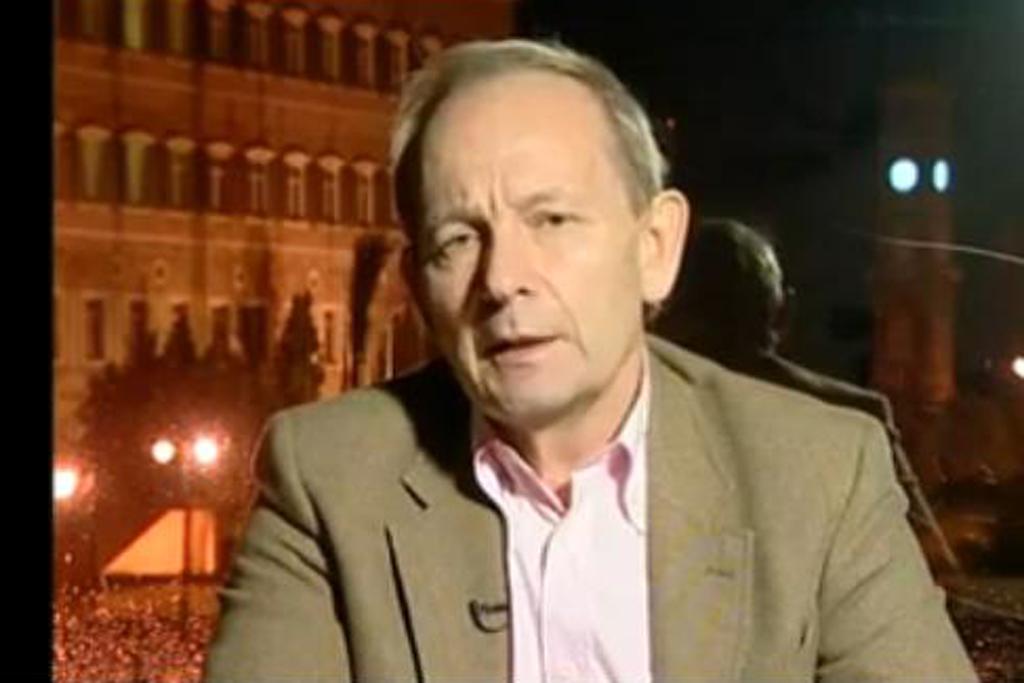Briefing for Bashar
Alastair Crooke is a former British spy who has used his role as head of a Middle East think tank to argue that the uprising in Syria is driven not by Syrian protesters but by a foreign plot to weaken Iran and that Assad’s security forces are not responsible for opening fire on protesters.
It takes a special kind of thinker to support a dictatorship police state which has killed over 6,000 of its own people and locked up nearly 20,000 more in an attempt to crush an uprising calling for freedom, originally triggered by the torture of children.
Alastair Crooke is one such man.
The former British spy made waves soon after setting up in Beirut after he was the source for the Seymour Hersh article claiming Al Qaeda-inspired militant group Fatah Islam was receiving support from the Lebanese government.
It was a claim repeated at the time by officials from Hezbollah, the Iranian-financed Shia militant group which was then seeking to topple the Western-backed Sunni-led government. Crooke had set up his think-tank Conflicts Forum a few years earlier with the express aim of giving voice to Islamist groups.
One of his early salvos across the uprising in Syria came back in July in a piece called ‘Unfolding the Syrian Paradox’ published in the Asia Times Online, the successor to the bankrupt Asia Times.
In his lengthy piece Crooke recognizes a “widespread demand for reform” in Syria but said “most Syrians also believe that President Bashar al-Assad shares their conviction for reform” despite the ruling Baath Party banning any surveys of public opinion that might back up such claims.
Yet rather than a domestic grievance against 41-years of one family rule which has impoverished a country once rich in oil and with huge potential in tourism, trade, manufacture and transport, Crooke argues the roots of Syria’s “bitterness” lie across the border, in Iraq.
“They extend back into the thinking of the Sunni jihadi trend, as advanced by [Al Qaeda leader] Abu Musab al-Zarqawi, which evolved in Iraq, surfaced violently in Lebanon, and was transposed into Syria with the return of many Syrian Salafist veterans at the "end" of the Iraq conflict,” he writes.
Crooke goes on to compare Syria’s unarmed protesters to the extremists of Fatah Islam, the group he briefed Hersh about.
After a lengthy pause, Crooke was back in the public domain this month, first with an article in the Guardian in which he characterized the uprising in Syria as part of a “great game” being played out between the Saudis, Americans, Qatar, France and Turkey in order to weaken Iran by felling its key ally in the region, Syria.
The plan for Syria, Crooke writes, was “feed in armed insurgents from neighbouring states; impose sanctions that will hurt the middle classes; mount a media campaign to denigrate any Syrian efforts at reform; try to instigate divisions within the army and the elite.”
Crooke sees the origins of this "lose Assad" operation as Israel’s failure to defeat Hezbollah in the July War of 2006. Almost uniquely among commentators on Syria, in over 1,300 words analysing the sources of instability in Syria, Crooke fails to once mention the street protests mounted by ordinary Syrians.
The article was followed up by an interview on the BBC World Service in which Crooke confidently predicted Assad had the full support of the majority of Syrians before appearing on the UK’s Channel 4 News to tell viewers of “statistics” (no source given) that he said show more members of Assad’s security forces had been killed than “other people.”
“I’ve been in situations too myself and under fire and in demonstrations,” said Crooke, “and I defy anyone to know really where the shooting is coming from.”
Every day, reporters and producers at The World are hard at work bringing you human-centered news from across the globe. But we can’t do it without you. We need your support to ensure we can continue this work for another year.
Make a gift today, and you’ll help us unlock a matching gift of $67,000!
